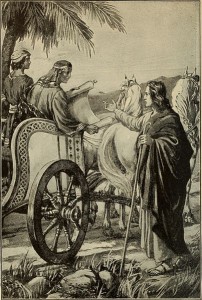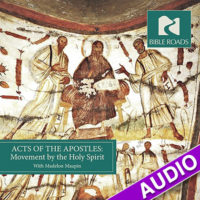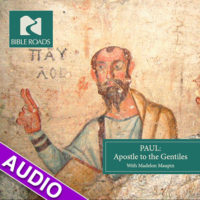
One Day in the Light of Prophesy and Providence (book) by Stewart Ambrose Spicer, 1921, page illustration.
Biblical pairings occur throughout the Scriptures but none more remarkably than in the book of Acts. There, people find each other through the most heavenly coincidences orchestrated by nothing less than the Holy Spirit. Acts is where we find the story of Philip and the Eunuch.
When we encounter Philip in Acts 8, he is taking his job description seriously: apostle. (There is another Philip who was Jesus’ disciple, but this Philip of Acts is referred to as Philip the Evangelist.) While the disciples were called ‘apostles’ during Jesus’ life, the Gospels use the term only 8 times compared to 256 for the word ‘disciple’.
An apostle, taken from the Greek word apostolos (meaning one who is sent), is an ambassador of the Gospel, a messenger sent on a mission with full authority. In the New Testament, it’s most often applied to one who is God’s spokesperson, and is used dozens of times following the ascension.
This is a contrast to the disciple, Philip’s, earlier role. ‘Disciple’ is derived from the Greek word mathetes (meaning a student, learner or pupil) from which our English word, mathematics, is taken. Doesn’t this underscore how much the disciple Philip was in a major learning mode during his spiritual apprenticeship with Jesus? Following the resurrection, a new group of followers of Jesus would rise up to meet the challenge of sharing the Gospel message. You might say it was graduation time or those who may have learned under the Master’s tutelage in olive grove classrooms.
Philip the Evangelist’s first foray out of Jerusalem was Samaria, described also in Acts 8. After important work was done there, an angel commissioned Philip for his next apostolic venture, directing him down a wilderness road to Gaza. Encountering an Ethiopian eunuch, Philip would convert not only a believer, but also someone who could take the Gospel to a new continent.
The Eunuch’s back-story is poignant. Such men were rarely born without the ability to procreate but rather mutilated as a result of capture during wartime. Then royal families would feel comfortable entrusting such to oversee harems or treasuries, exactly as his queen entrusted this eunuch.
We might assume the man traveled north due to business on behalf of the royal household, in Israel. But we’re only hypothesizing. The text says simply:
He had come to Jerusalem to worship and was returning home; seated in his chariot, he was reading the prophet Isaiah (Acts 8:27,28).
Luke’s book of Acts doesn’t say he actually completed his mission of worshipping, only that it was his intention. It’s not difficult to imagine both his dismay and disappointment upon learning that Jerusalem’s religious leadership didn’t allow eunuchs in the Temple. The geographical distance of 2400 miles traveled from Ethiopia to Jerusalem, a three-day car drive at 60 mph by today’s measure, doesn’t begin to comprehend the long trip by horse-drawn chariot over dusty roads. Yet even more grueling would have been the emotional journey this outcast was on, looking for answers that could transform his life from humiliation to inspiration.
Consider the joy of ‘happening’ on Philip who could spiritually discern the man’s earnestness, just as the eunuch could discern Philip’s ability to explain the spiritual meaning of a text that the literate eunuch could already read. This was a heavenly pairing that began with receptivity to Spirit’s guidance and led to discernment of Scripture. That Isaiah was the focus of the eunuch’s inquiry might be explained in part because of its promise to his own challenging status:
…do not let the eunuch say,
“I am just a dry tree.”
For thus says the Lord:
To the eunuchs who keep my sabbaths,
who choose the things that please me
and hold fast my covenant…
I will give them an everlasting name
that shall not be cut off (Isa. 56:3-5).
But surely it was the referenced chapter quoted, Isaiah 53:7-8, that provides the most insight into this divine encounter. Isaiah’s description of a Messiah that will be oppressed, afflicted and ‘like a lamb led to slaughter’, were all human conditions with which the eunuch could readily identify. Even more, further chapters would prophesy that God promises to “gather the outcasts of Israel” (Isa. 56:8), something this eunuch also knew much about.
Perhaps both apostle and convert removed their sandals as Moses did, realizing the holy ground they indeed were on as the 600 year old prophesy was being fulfilled by their very lives.




A wonderful, insightful, offering. Thanks so much.
I was not aware of the Isa 56 passage. Thank you for drawing those ideas together. Could the hope of this passages have drawn him to Jerusalem to worship, only to be turned away at the temple? Yet, despite the lack of following the Scriptures by people to gather the oppressed, the Eunuch returned to the Word searching. This story speaks to the church of its role and the dangers of exclusivity, but it also speaks to the seeker to not let oppressions by people keep you from God. Thank you Madelon for fresh inspiration to this Bible story.
Hi Madelon. I so enjoy your way of making these stories come alive for us. It is noteworthy that Philip the Evangelist was having great success doing his evangelizing work in Samaria at the time he was directed to head down the road where he met the eunuch. What obedience he showed in leaving the place where he seemed to be prospering! That’s another wonderful aspect of this great pairing.
Joanne, You are absolutely right! I forgot about Philip the Evangelist being a completely different individual than the disciple. Am glad to know I have good company in the confusion as Papias and Polycrates, an early Church historian and the other, a bishop of Ephesus, did the same. Thank you for your alertness. The good thing is that the distinction between apostle and disciple is still accurate, even if in two individuals instead of one. Again, so appreciate your alertness. Madelon
The connectedness between the Bible verses and the eunuch’s experience no doubt led him to believe the promises in Isaiah. That he asked to be baptized straight away would speak to the power of the Spirit.
Good catch, Joanne Otto.